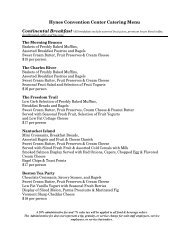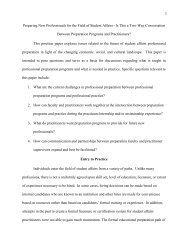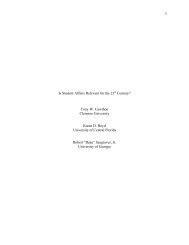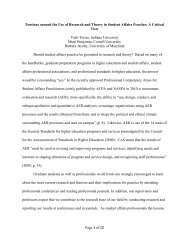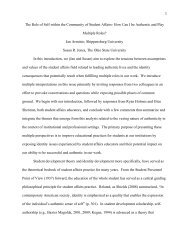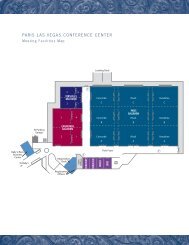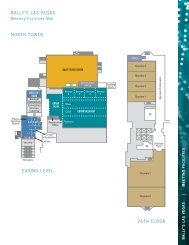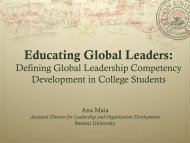Dear ACPA Colleagues: - ACPA 2014 Indianapolis Convention
Dear ACPA Colleagues: - ACPA 2014 Indianapolis Convention
Dear ACPA Colleagues: - ACPA 2014 Indianapolis Convention
You also want an ePaper? Increase the reach of your titles
YUMPU automatically turns print PDFs into web optimized ePapers that Google loves.
Monday, March 28<br />
2011 aCpa annuaL <strong>Convention</strong><br />
10:30 AM – 11:30 AM<br />
The recent trend towards internationalization<br />
in higher education has created a need for<br />
student affairs practitioners to be prepared to<br />
engage in the development of intercultural<br />
competence and respond to the needs of<br />
an increasingly diverse student body, both<br />
within the United States and abroad. This<br />
program will discuss the potential for shortterm<br />
study abroad programs to facilitate the<br />
development of intercultural competence in<br />
student affairs educators using the example of<br />
a recent study abroad course in Doha, Qatar.<br />
340 Crossing Developmental<br />
Borders Through Participation<br />
in HIV/AIDS-Focused Service-<br />
Learning<br />
Student Learning and Development;<br />
Evidence and Improvement<br />
Sponsored Program<br />
Location: Baltimore <strong>Convention</strong> Center, 321<br />
CEs: 1<br />
Program Presenter: Lucy LePeau, University<br />
of Maryland, College Park<br />
Additional Presenters: Susan Jones, Ohio<br />
State University; Claire Kathleen Robbins,<br />
University of Maryland, College Park<br />
Service-learning is a pedagogy educators<br />
use to engage college students civically<br />
and enhance their knowledge about and<br />
commitments to social justice. Alternative<br />
break (AB) programs, involving short-term<br />
immersion in culturally specific settings, offer<br />
one promising approach to service-learning.<br />
Presenters will share results and student<br />
affairs practice implications of two studies<br />
investigating longer-term outcomes of an AB<br />
program focused on HIV/AIDS. Participants<br />
will engage in an interactive discussion about<br />
the possibilities and limitations of servicelearning.<br />
341 Partnerships in Action:<br />
A Critical Look at Service-<br />
Learning Partnerships<br />
Student Learning and Development;<br />
Assessment, Evaluation, and Research<br />
(AER)<br />
Location: Baltimore <strong>Convention</strong> Center, 350<br />
Program Presenter: Amanda Johnson,<br />
Syracuse University<br />
Additional Presenters: Timothy Eatman,<br />
Syracuse University<br />
This program will demonstrate the exchange<br />
of knowledge that occurs between students<br />
and community partners engaged in an<br />
institution-community partnership. An<br />
overview of the service-learning courses will<br />
be provided. The presenters will share the research<br />
methodology and themes developed in<br />
student focus groups and community partner<br />
interviews. Presenters will facilitate a discussion<br />
about the study’s findings, program<br />
attendees’ professional experiences, and how<br />
to contribute to community-based research.<br />
342 More Than Just Study<br />
Skills: Helping Students<br />
Succeed in Academics<br />
Location: Baltimore <strong>Convention</strong> Center, 324<br />
Program Presenter: Sherry Woosley, Ball<br />
State University<br />
Additional Presenters: Kathleen Gardner,<br />
Southern Illinois University Edwardsville<br />
Academic self-efficacy has a significant impact<br />
on motivation, behaviors, and outcomes<br />
but how much do you know about selfefficacy?<br />
This session will discuss self-efficacy<br />
theory, research, and practice as related to<br />
first-year college students. Specifically, we<br />
will talk about the origins of self-efficacy,<br />
the relationship of self-efficacy to students’<br />
expectations and motivation, and the impact<br />
of self-efficacy on behaviors and academic<br />
outcomes. Finally, the relationship of this<br />
information to practice will be made through<br />
concrete examples and group discussion.<br />
343 Inside the Classroom:<br />
Preparing LGBTQ Competent<br />
Student Affairs Professionals<br />
Student Learning and Development;<br />
Equity, Diversity, and Inclusion<br />
Location: Baltimore <strong>Convention</strong> Center, 341<br />
Program Presenter: James DeVita, Iowa<br />
State University<br />
Additional Presenters: Carrie Kortegast,<br />
Iowa State University<br />
Preparing student affairs master's students to<br />
work with LGBTQ students requires more<br />
than just reviewing identity models and<br />
campus climate studies. Graduate preparation<br />
programs and faculty members have a<br />
responsibility to academically and emotionally<br />
prepare students to adequately discuss,<br />
advocate, and support LGBTQ people and<br />
issues. Program participants will engage in<br />
conversations on how we 1) teach about LG-<br />
BTQ issues, 2) discuss LGBTQ issues in the<br />
classroom, and 3) prepare students to work<br />
with LGBTQ issues and people.<br />
344 “Quizzes in Student<br />
Affairs?”: The Benefits of<br />
Using Direct Assessments<br />
Evidence and Improvement;<br />
Assessment, Evaluation, and Research<br />
(AER)<br />
Sponsored Program<br />
Location: Baltimore <strong>Convention</strong> Center, 342<br />
Program Presenter: Nathan Lindsay,<br />
University of North Carolina-Wilmington<br />
Additional Presenters: Jenn Smist,<br />
University of North Carolina-Wilmington;<br />
Aimee Hourigan, University of North Carolina-<br />
Wilmington; Larry Wray, University of North<br />
Carolina-Wilmington<br />
Assessment in student affairs has often been<br />
limited to indirect assessments, in which<br />
administrators ask students to self-report<br />
their development and degree of learning.<br />
Assessment experts are now encouraging<br />
staff to use direct assessments that require<br />
students to demonstrate their learning in<br />
quizzes, tests, and portfolios. This presentation<br />
highlights three separate programs in<br />
housing, substance abuse prevention, and<br />
student leadership that used direct assessments<br />
to provide a more accurate picture of<br />
their student leaders’ learning.<br />
345 Engaging Campus Agents<br />
of Change in Student Decision<br />
Making<br />
Student Success; Advising and Helping<br />
Location: Baltimore <strong>Convention</strong> Center, 316<br />
Program Presenter: Allison Pearlman Sax,<br />
Loyola University Maryland<br />
Additional Presenters: Cynthia Parcover,<br />
Loyola University Maryland<br />
Through the Department of Education<br />
Grant to Reduce High Risk Drinking, Loyola<br />
University Maryland has created a training<br />
model for cultivating behavior change among<br />
students by partnering with faculty and other<br />
leaders who work directly with students. The<br />
training is grounded in the concepts of Motivational<br />
Interviewing. Conference attendees<br />
will receive a training module to apply to<br />
their own campuses. In addition, presenters<br />
will explore the processes of training imple-<br />
42 Latest <strong>Convention</strong> updates on twitter, @aCpa<strong>Convention</strong> or http://<strong>Convention</strong>.myaCpa.org/sCheduLe




